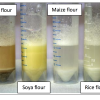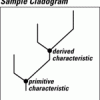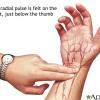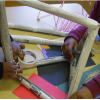Search Results
Showing results 41 to 60 of 1372

A Flag for Your Planet
Source Institutions
In this activity, learners design a flag for a chosen or assigned planet. The instructions include information about flags on Earth, and a list of flag references.

Newton's Laws Demonstrations
Source Institutions
In this collection of demonstrations, learners explore Newton's Laws of Motion.

Battleships: Searching Algorithms
Source Institutions
This activity explores the main algorithms that are used as the basis for searching on computers, using different variations on the game of battleships.

CD Spinner
Source Institutions
In this activity, learners create a simple “top” from a CD, marble and bottle cap, and use it as a spinning platform for a variety of illusion-generating patterns.

Wheat Evolution: Sedimentation Testing
Source Institutions
In this activity (Page 30 of PDF), learners investigate the evolution of wheat by conducting sedimentation tests on different flours.

The Missing Link
Source Institutions
In this activity, learners collect, analyze, and interpret information about objects in order to classify them into a cladogram. Use this activity to talk about how scientists classify things.

Glaciers
Source Institutions
In this online activity, learners adjust mountain snowfall and temperature to see how glaciers grow and shrink. They will use scientific tools to measure thickness, velocity and glacial budget.

Amazing Albedo
Source Institutions
In this experiment, learners work in teams to investigate how the color of a surface influences its ability to reflect light and therefore heat.

Invisible Ink Demonstration
Source Institutions
In this chemistry demonstration, learners will discover that phenolphthalein is a chemical that displays different colors depending on the acidity or basicity of the environment.

The Power of Words
Source Institutions
This simple, yet surprising physics demonstration challenges preconceptions about forces, and demonstrates the strength of atmospheric pressure.

The Pulse of Gravity
Source Institutions
In this astronomy activity (page 3 of the PDF), learners will examine the effects of gravity on a person’s pulse and explore how gravity can differ from planet to planet.

Nature Painting
Source Institutions
In this activity learners will create paint out of natural materials. Explore your natural world (or your fridge) and find berries, leaves, or flowers to find a great base for your paint.

Cells and Walls
Source Institutions
Using toothpicks, straws, or tubes of rolled up newspaper, learners create 3-dimensional models to illustrate the basic structure and function of the cell membrane, and place an object inside to repre

Have a Heart
Source Institutions
Your heart pumps blood throughout your body in one direction, around in a loop. In this activity, learners will make a model of one type of heart chamber called a ventricle.

The Scoop on Habitat
Source Institutions
Some aquatic organisms live in open water, while some live in soil at the bottom of a body of water.

Separation Anxiety
Source Institutions
In this activity, learners discover the primary physical properties used to separate pure substances from mixtures.

Hull Engineering
Source Institutions
In this activity, learners explore how the hull shape impacts a ship's performance and stability.

Let's Clone a Mouse, Mouse, Mouse...
Source Institutions
Somatic Cell Nuclear Transfer (SCNT) is a cloning method that involves transferring a nucleus from a somatic cell of the individual to be cloned to an enucleated egg.

Hold a Hill
Source Institutions
In this outdoor activity, learners investigate the relationship between the slope of a trail and soil erosion.

Exploring Products: Nano Sand
Source Institutions
In this activity, learners explore how water behaves differently when it comes in contact with "nano sand" and regular sand.
